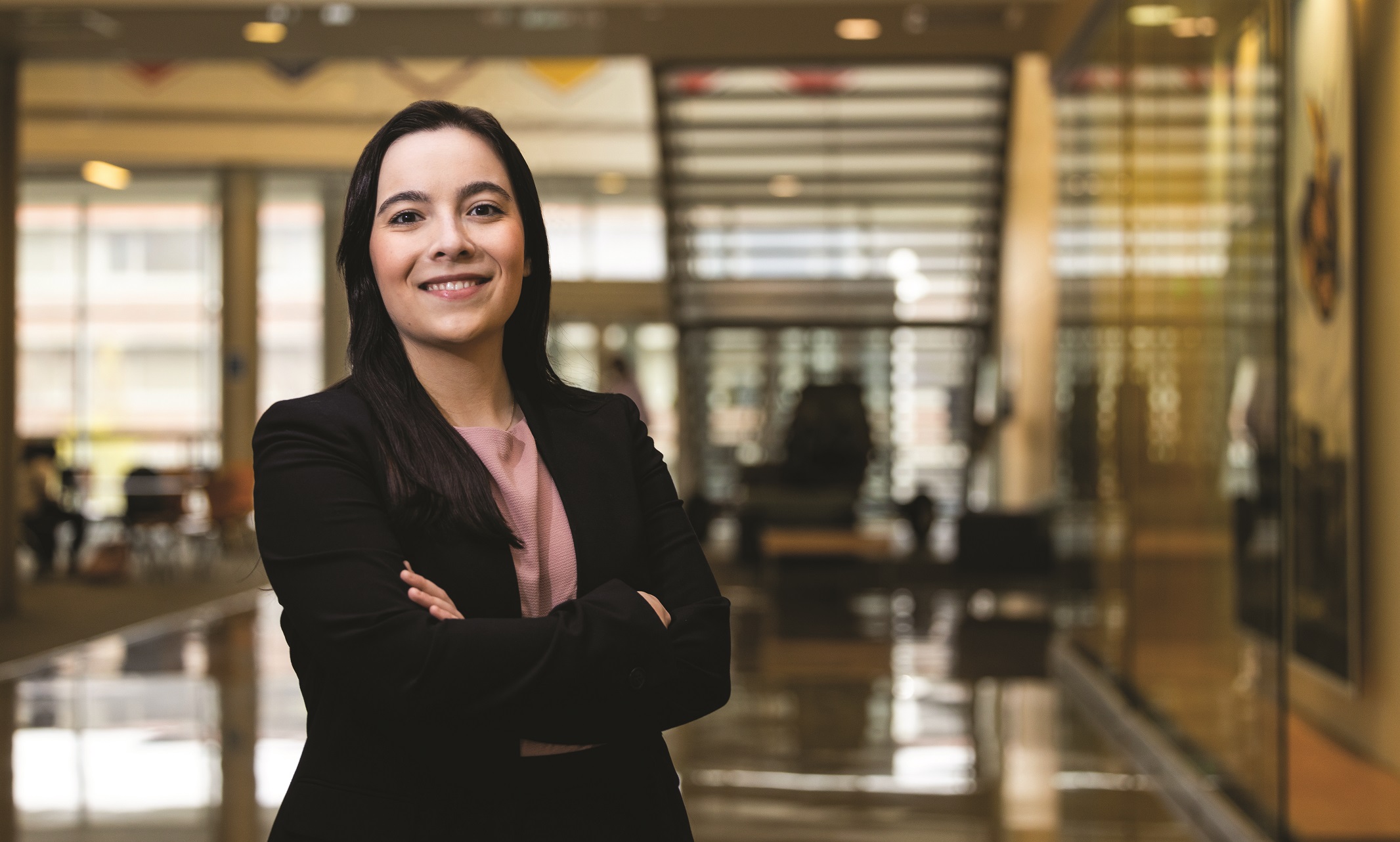Kylee Gomez found her niche in the UMKC School of Law helping people who have faced criminal charges find second chances.
It was a natural fit for a law student who earned a double major as an undergrad in criminal justice/criminology and political science.
“Like many Americans, I have loved ones who have struggled with substance abuse disorder,” said Gomez. “I care about individuals that have been through the criminal justice system and others that were close to it. I believe our system should give second chances and provide better opportunities for rehabilitation.”
As an undergraduate, Gomez volunteered with local organizations focused on criminal justice reform and rehabilitation. One of those volunteer opportunities was the School of Law’s Clear My Record Project. Gomez points out that for many in Missouri with criminal records, their convictions have become “the punishment that never ends.” Despite having fully paid their debt to society, they find the impact of their record lingers, blocking educational, employment and housing opportunities. The persistence of criminal records also takes a heavy toll on a person’s health.
She volunteered for the Clear My Record project and then was given permission to enroll in the Law, Tech and Public Policy law school course in order to help lead the project.
“My interactions with the law school faculty and staff during the Clear My Record Project are what really encouraged me to apply for UMKC’s law school,” said Gomez. “As a first-generation student, the decision to pursue a professional degree was nerve-wracking because no one in my family had that experience. However, my family's support and the guidance I received from my UMKC professors made the process easier.”
Gomez now works with clients at the UMKC Law Expungement Clinic – which developed out of the 2019 Clear My Record Project.
“I have a passion for public interest law and public policy and want to establish my career aiding in the expansion of equal justice for all,” said Gomez. “The expungement clinic gives me the opportunity to do that, while helping those right here in the Kansas City community.”
Individuals may request the sealing of criminal records under Missouri’s expungement law, but the process is complex and expensive. As a result, only 125 individuals were able to expunge their criminal records in
2019, despite the fact that an estimated 1.3-1.8 million Missourians possess criminal records. According to a recent study of a similar jurisdiction, the expungement process is so complex that only 6.5% of people eligible for record clearance actually filed petitions. The benefit of expungement is profound. Once expungement is granted, an individual may truthfully answer “no” to questions seeking information about the existence of prior eligible convictions, including housing and employment applications.
“As a first-generation student, the decision to pursue a professional degree was nerve-wracking because no one in my family had that experience. However, my family's support and the guidance I received from my UMKC professors made the process easier.”
Gomez, about to enter her third year of law school, is a first-generation student. Resources on campus and volunteer opportunities helped her find her path in school.
“Like many other first-gen students, I navigated my own way through higher education,” said Gomez. “The resources on campus, especially peer mentorship, career services and academic advising, were extremely helpful. My family supported me but couldn’t always guide me through the process of being a college student.”
In addition to working at the expungement clinic, Gomez is a student emissary, teaching assistant and UMKC Law Review comment editor.
Gomez’s ability to, not only balance her various responsibilities, but also excel at them, caught the eye of Professor Wanda Temm.
“Kylee was a student in my first-year Lawyering Skills course. She received the Joseph E. Stevens Memorial Prize, given to the top first-year student who shows the most promise in legal writing,” said Temm. “Some years, we agonize over the decision of whom to select. Not that year. Kylee was a unanimous choice.”
After having her in class, Temm encouraged Gomez to apply to be a teaching assistant. She says Gomez possesses all the right characteristics – maturity, good judgment, a calm demeanor, the ability to relate to others, patience and willingness to work hard.
“Helping other students begin their legal writing journey has been a really rewarding experience,” said Gomez.
Temm’s Lawyering Skills class isn’t the first experience Gomez has as a teaching assistant; she helped construct and teach an LSAT prep class with Dean Barbara Glesner Fines.
“Given that my last exposure to the LSAT was decades earlier, I knew I needed a teaching assistant to help,” said Glesner Fines. “I needed a student who did well on the LSAT and could help me find ways to prepare other students to do the same. I asked admissions, career services staff, fellow faculty members and administrators for recommendations. They all recommended Kylee.”
Gomez’s work for the LSAT prep class and her work as a student emissary are both focused on helping other students learn about law school, and the UMKC School of Law in particular. Student emissaries and the UMKC law school admissions team were an important part of her journey.
“I got to know Kylee during the Clear My Record project and the law school admissions process,” said Lauren Butler, director of admissions at the School of Law. “I could see how excited she was about the project and the possibility of law school. She has a passion for helping people, and I have no doubt that excitement will follow her into her legal practice.”
So, what does Gomez envision for her future?
“I’m hoping to clerk for a judge after I graduate," Gomez said. "I think clerking is the best way to gain mentorship and continue my legal writing and advocacy capabilities before entering practice.”

